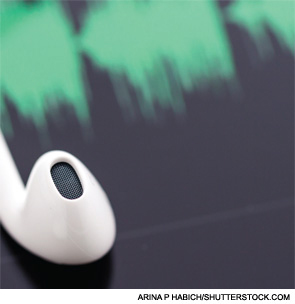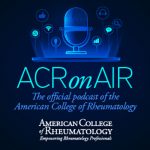
Michael Laccheo, MD, Paul Sufka, MD, and Suleman Bhana, MD, were shooting the breeze back in March. The setting? Your smartphone.
The three rheumatologists are podcasters and they produce a podcast with the literal title, The Rheumatology Podcast, presumably to make it easy to find in searches.
At the start of a recent show, the three were talking about, of all things, podcasting, including how they came to start one of their own.
“I found two bozos on Twitter [who] were nerdy enough and geeky enough for me to record with,” says Dr. Bhana, affectionately known as “Sully” to the others. “That’s basically what happened.”
The easygoing style is what the three doctors were going for when they started producing the show about two years ago. The podcast, which comes out once or twice a month, now has about 500 listeners.
In an era of on-the-go doctors, podcasts could become more central to the way rheumatologists and other physicians get their information—and stay entertained. They offer a way to keep up with the literature and to stay connected with the rheumatology community.
The Podscape
The number of podcasts produced in the U.S. has actually been fairly stagnant since 2010, when there were 89,455, according to the Pew Research Center. In 2013, there were 91,794, according to the Pew Center.
But the number of podcast listeners—those who said they listened to a podcast in the past month—rose 25% from 2013 to 2014, according to Edison Research. The firm found that 15% of Americans—or 39 million people—had listened to a podcast in the previous month.
If The Rheumatology Podcast is any indication, part of the reason for the stagnant number of podcasts—but a counterintuitive jump in listenership—might be that the overall quality of podcasts is improving, if not the number of them.
The Launch
In fact, the lack of what they saw as a quality rheumatology podcast was the main reason the trio began producing their Web-based show. When they searched “rheumatology podcast” on Google, they mostly drew blanks.
“There’s not any other great rheumatology podcast out there,” says Dr. Sufka, a rheumatologist with HealthPartners in St. Paul, Minn. “There [are] some that go along with medical journals, but often they’re not talking about truly relevant topics for clinical rheumatologists. Some of them are directed more at news-type information.”
Michael Laccheo, MD, a rheumatologist with Arthritis & Rheumatic Diseases in Williamsburg, Va., and the most tech minded of the group, says some call themselves podcasts but really just involve “reading the table of contents of the journal that month.”
Having met through Twitter, the doctors started the podcast in November 2012. They now have an estimated 500–600 listeners—not a legion, but Dr. Laccheo says it’s still a bit intimidating to think there are so many doctors listening in.
The Process
The doctors have never been in the same room all at once, Dr. Sufka says.
To do the show, all they really need is a microphone, Skype, recording software (even GarageBand on a Mac would work fine), and a quiet room. When recording, each doctor records his own voice locally in case there’s a problem with the Skype connection. Dr. Laccheo used to edit the show, but they’ve gotten a few sponsors and recently hired a professional editor for that.
Recent shows have included discussions on biologics, tofacitinib, ustekinumab and how turmeric might be helpful in osteoarthritis of the knee. They also throw in chit-chat about technology and anything else that might cross their minds.
“We use this as a way for us to learn, as well, and I think that’s how you keep it enjoyable,” Dr. Sufka says. “If this [is] something I would have to learn on my own, why not do it in public and help other people maybe pick something else up, too?”
Dr. Laccheo says a podcast is a great way to dissect new studies. “When a study comes out, it’s not just black or white,” he says. “We have to argue about the benefits, the risks. Do we think it’s a good study? Having that conversation is very important.”
A good podcast, he says, has to be a regularly produced show; it has to have good audio quality, and it has to both entertain and educate.
“Podcasting is very personal,” he says. “You introduce yourself. You’re talking to your audience. It’s like you’re sitting there having a conversation at a bar.”
“It’s got to be something that you want to keep listening to,” he says. “The moment when you’re listening to some great story on NPR, and you get home, and you stay in your car because you want to hear the end of that story; I think a podcast has to be same way. It’s got to be entertaining.”
The Buzz
For doctors “on the go all the time,” podcasts are a great option, says Chris Wright, MD, a rheumatologist in Houston and a devotee of The Rheumatology Podcast.
“Once it’s been published I can listen to it at any time, as many times as I like, on my schedule,” he said. “Podcasting is like translating the benefits of a cable DVR to audio entertainment.”
He says he found the discussions of apremilast and tofacitinib helpful, and they increased his comfort level with the drugs.
He suspects, though, that podcast listenership among doctors is quite low, because when he endorses the podcast to his colleagues, “not a single one has had the faintest idea what I’m talking about.”
Even though the learning curve is small—installing a podcast app on a smartphone then subscribing to podcasts—there is nonetheless a learning curve, he says.
“I think more people will get interested in podcasting as conventional media outlets educate their readers and listeners about them,” Dr. Wright says. Listeners would get both entertainment and valuable discussion, he says.
“Medicine is as much art as science, meaning there are many situations where there is no ‘right’ or ‘wrong’ answer,” he says. “I think it’s beneficial to hear colleagues’ opinions and experience on tricky problems, and many rheumatologists may not have access to grand rounds, academic conferences or other settings where these discussions might otherwise take place.”
Thomas R. Collins is a freelance medical writer based in Florida.
Updated 10/15/2014.
The Podcasts
Here are the favorite podcasts of the doctors who produce The Rheumatology Podcast, some medical and some not:
- Oxford Rheumatology Podcast
- Accidental Tech Podcast
- The Talk Show
- Planet Money
- This American Life
- Blogging Heads TV
- Political Gab Fest
- Culture Gab Fest
- The Bugle—John Oliver
- Giant Bomb Cast
- The Vice Media Podcast
- 5by5 Podcast Network
- Barbell Shrugged
- Verge Cast
- Freakonomics
- Decode DC
- The Critical Path
- WTF—Mark Marron
- Physicians Practice
And they use these smartphone apps to capture and play them:
- Pocket Casts
- Downcast


